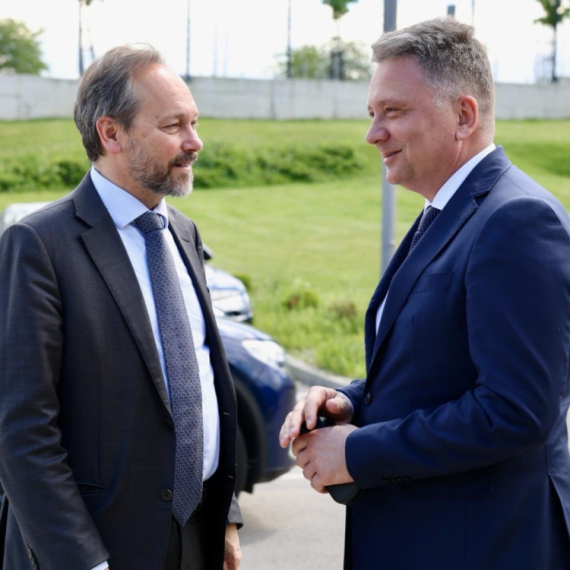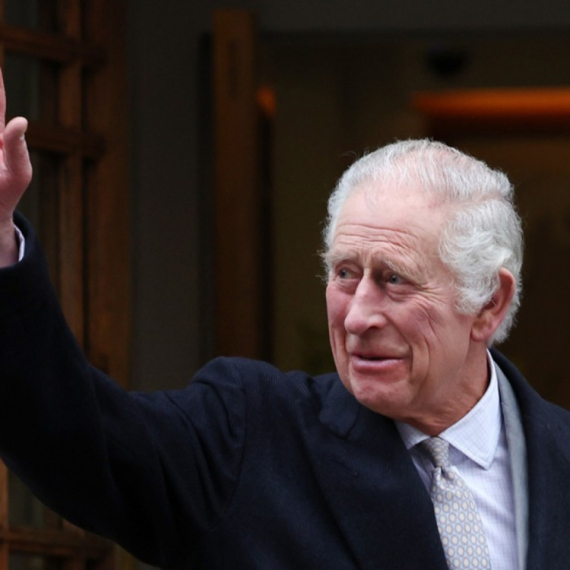No agreement in talks on implementation
The talks in Brussels on implementing the Kosovo agreement initialed in April have ended without an agreement, reportedly after the Priština side walked out.
Wednesday, 08.05.2013.
17:20

BRUSSELS The talks in Brussels on implementing the Kosovo agreement initialed in April have ended without an agreement, reportedly after the Pristina side walked out. The teams of Belgrade and Pristina started these talks on Tuesday. No agreement in talks on implementation Reports on Wednesday said that their meeting did not produce results, and that Ivica Dacic and Hashim Thaci would meet in Brussels on May 21. Presidential adviser Marko Djuric, who led the Belgrade team, stated that they on Tuesday asked for a start of negotiations with Pristina on essential issues, on the highest level. He explained that these issues concerned Serbs and the Serbian Orthodox Church in the province, and were not solved in the agreement on normalization of relations between Belgrade and Pristina. According to Djuric, the Belgrade delegation presented its comprehensive plan that would ensure that the future community of Serb municipalities "has precisely those rights envisaged by the agreement, and in order to ensure that the implementation is in the spirit of what was initialed." Djuric also said that the EC officials "did not have any significant objections" to this plan. Djuric also revealed that the Pristina delegation walked out of the meeting on Wednesday, and added that the Belgrade team regretted that decision as it had approached the talks "with the best intentions, and with the goal that the spirit and letter of the agreement be implemented." Sources close to the talks between the working groups said that Pristina asked for the Serbian institutions in northern Kosovo to first be dismantled, to then, "primarily with the participation of the Pristina authorities," form new Serb institutions. They also demanded that an interim body be formed first to take over the current powers of Serb municipalities in Kosovo, and to only later form the community of Serb municipalities. The Belgrade team found this unacceptable, as it was contrary to the agreement's provision on having the Serbian institutions "integrated into the system in Kosovo but with own political influence and status." According to these sources, the Pristina team also, "contrary to the spirit and letter of the agreement," wanted all courts in the Serbian municipalities dismantled, to later form new ones, "exclusively in line with Kosovo laws." Djuric told reporters that he could not say when and in which format these talks might continue, and also noted that he "did not know on what basis" Pristina team head Hajredin Kuci announced a meeting between Dacic and Thaci for May 21. The two sides first attempted to agree on an implementation plan when their delegations met on April 26. Earlier today, Serbian PM Ivica Dacic said that negotiations with Pristina would resume "on the highest level" in the second half of May, and added that he believed that the EU would give Serbia a date for the start of accession talks. Marko Djuric (Tanjug, file) B92 Beta Tanjug
No agreement in talks on implementation
Reports on Wednesday said that their meeting did not produce results, and that Ivica Dačić and Hashim Thaci would meet in Brussels on May 21.Presidential adviser Marko Đurić, who led the Belgrade team, stated that they on Tuesday asked for a start of negotiations with Priština on essential issues, on the highest level.
He explained that these issues concerned Serbs and the Serbian Orthodox Church in the province, and were not solved in the agreement on normalization of relations between Belgrade and Priština.
According to Đurić, the Belgrade delegation presented its comprehensive plan that would ensure that the future community of Serb municipalities "has precisely those rights envisaged by the agreement, and in order to ensure that the implementation is in the spirit of what was initialed."
Đurić also said that the EC officials "did not have any significant objections" to this plan.
Đurić also revealed that the Priština delegation walked out of the meeting on Wednesday, and added that the Belgrade team regretted that decision as it had approached the talks "with the best intentions, and with the goal that the spirit and letter of the agreement be implemented."
Sources close to the talks between the working groups said that Priština asked for the Serbian institutions in northern Kosovo to first be dismantled, to then, "primarily with the participation of the Priština authorities," form new Serb institutions. They also demanded that an interim body be formed first to take over the current powers of Serb municipalities in Kosovo, and to only later form the community of Serb municipalities.
The Belgrade team found this unacceptable, as it was contrary to the agreement's provision on having the Serbian institutions "integrated into the system in Kosovo but with own political influence and status."
According to these sources, the Priština team also, "contrary to the spirit and letter of the agreement," wanted all courts in the Serbian municipalities dismantled, to later form new ones, "exclusively in line with Kosovo laws."
Đurić told reporters that he could not say when and in which format these talks might continue, and also noted that he "did not know on what basis" Priština team head Hajredin Kuci announced a meeting between Dačić and Thaci for May 21.
The two sides first attempted to agree on an implementation plan when their delegations met on April 26.
Earlier today, Serbian PM Ivica Dačić said that negotiations with Priština would resume "on the highest level" in the second half of May, and added that he believed that the EU would give Serbia a date for the start of accession talks.







































Komentari 17
Pogledaj komentare